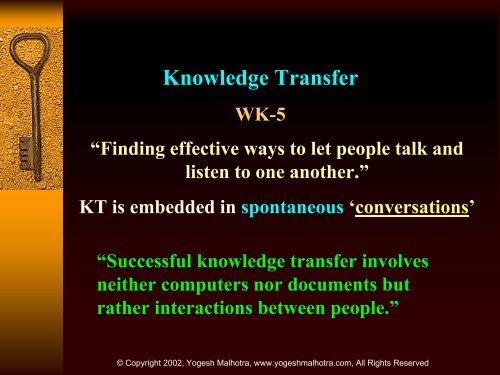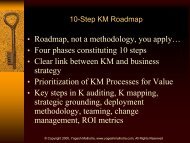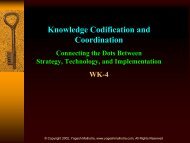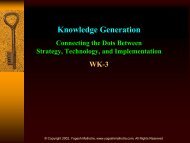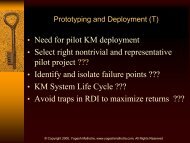Knowledge Transfer: Strategy & Implementation
Knowledge Transfer: Strategy & Implementation
Knowledge Transfer: Strategy & Implementation
- No tags were found...
You also want an ePaper? Increase the reach of your titles
YUMPU automatically turns print PDFs into web optimized ePapers that Google loves.
<strong>Knowledge</strong> <strong>Transfer</strong>WK-5“Finding effective ways to let people talk andlisten to one another.”KT is embedded in spontaneous ‘conversations’“Successful knowledge transfer involvesneither computers nor documents butrather interactions between people.”© Copyright 2002, Yogesh Malhotra, www.yogeshmalhotra.com, All Rights Reserved
“When Good Enough is Not Good Enough.”“Knowing What You Know… Challenge”“Can You Know What You Know…?© Copyright 2002, Yogesh Malhotra, www.yogeshmalhotra.com, All Rights Reserved
“The best information environments willtake advantage of the ability of IT toovercome geography but will alsoacknowledge that the highest bandwidthnetwork of all is found between the waterfountain and the coffee machine.”© Copyright 2002, Yogesh Malhotra, www.yogeshmalhotra.com, All Rights Reserved
“We have documents, documentdatabases, an Intranet Web, groupware,… But the assignees and the F2F meetingare by far the most important channelsfor transferring knowledge to themember firms.”© Copyright 2002, Yogesh Malhotra, www.yogeshmalhotra.com, All Rights Reserved
The Three Components of <strong>Knowledge</strong>Management:• <strong>Knowledge</strong> generation.Includes all activities, which brings to light knowledgethat is "new" to the individual, to the group, and tothe organization.• <strong>Knowledge</strong> codification.Representation of knowledge so that it can be "reused"either by an individual or an organization.• <strong>Knowledge</strong> transfer.“Movement of knowledge from one location toanother”.© Copyright 2002, Yogesh Malhotra, www.yogeshmalhotra.com, All Rights Reserved
Means of <strong>Knowledge</strong> <strong>Transfer</strong>• <strong>Knowledge</strong> Fairs – E&Y, CSIRO• Unstructured, Ad Hoc• versus Structured, Micro-Planned Conferences• Japanese Talk Rooms• <strong>Knowledge</strong> Markets – Any organization thatexchanges for other things of value – money, respect,promotions, or knowledge• Communities of Practice – knowledge flows bestthrough networks of people with similar interest© Copyright 2002, Yogesh Malhotra, www.yogeshmalhotra.com, All Rights Reserved
Tacit: <strong>Knowledge</strong> not easy to visualize andexpress. Highly personal and hard to formalize.Explicit: Can be expressed in words andnumbers and can easily be communicated andshared in the form of hard data.<strong>Knowledge</strong> conversion: Tacit and Explicitknowledge interact and interchange into eachother in the creative activities of human beings.<strong>Knowledge</strong> is created through socialinteraction of the two types of knowledge!© Copyright 2002, Yogesh Malhotra, www.yogeshmalhotra.com, All Rights Reserved
Tacit and Explicit <strong>Knowledge</strong>Tacit <strong>Knowledge</strong>– Embedded in the human brain– Cannot be expressed easily– Requires extensive personal contact– Mentorship networks– <strong>Knowledge</strong> Maps, Video conferencingExplicit <strong>Knowledge</strong>– Can be easily codified,– Embedded in procedures,– Represented in documents,– <strong>Transfer</strong>red with reasonable accuracy© Copyright 2002, Yogesh Malhotra, www.yogeshmalhotra.com, All Rights Reserved
Cultures of <strong>Knowledge</strong> <strong>Transfer</strong>• Lack of trust• Different, cultures, language, mental models• Lack of time and meeting places• Status and rewards issues• Lack of absorptive capacity• Not-invented-here syndrome• Intolerance for errors and mistakes© Copyright 2002, Yogesh Malhotra, www.yogeshmalhotra.com, All Rights Reserved
<strong>Transfer</strong> = Transmission + Absorption (and Use)No Action => Useless <strong>Knowledge</strong> [<strong>Transfer</strong>]© Copyright 2002, Yogesh Malhotra, www.yogeshmalhotra.com, All Rights Reserved
"the movement of knowledge within theorganization is a distinct experience, not agradual process of dissemination, and dependson the characteristics of everyone involved"<strong>Transfer</strong> of knowledge does not denote a fullreplication of the knowledge in the receiving unit.Indeed, knowledge is often modified in thereceiving unit. The key element in knowledgetransfer is not the underlying (original) knowledge,but rather the extent to which the receivingsubsidiary receives potentially useful knowledgeand utilizes this knowledge in its own operations.© Copyright 2002, Yogesh Malhotra, www.yogeshmalhotra.com, All Rights Reserved
<strong>Knowledge</strong> <strong>Transfer</strong>• Four different modes of knowledgeconversion– Socialization– Externalization– Combination– Internalization© Copyright 2002, Yogesh Malhotra, www.yogeshmalhotra.com, All Rights Reserved
Socialization: “The process of sharingexperiences and thereby creating tacitknowledge, such as shared mental modelsand technical skills. The key to acquire tacitknowledge is experience. Without someshared experience, it is extremely difficultfor one person to project her/himself intoanother individual‘s thinking process.”© Copyright 2002, Yogesh Malhotra, www.yogeshmalhotra.com, All Rights Reserved
Externalization: “The process of articulatingtacit knowledge into explicit concepts. It mayhowever be difficult to find an adequateverbal expression for a mental image troughuse of analytical methods alone.Externalization is therefore often driven bymetaphor and/or analogy.”© Copyright 2002, Yogesh Malhotra, www.yogeshmalhotra.com, All Rights Reserved
Combination: “The process of systematizingconcepts into a knowledge system, i.e.combining different bodies of explicitknowledge. This entails reconfiguration ofexisting information, where sorting, adding,combining and categorising of explicitknowledge can lead to new knowledge.”© Copyright 2002, Yogesh Malhotra, www.yogeshmalhotra.com, All Rights Reserved
Internalization: “This process is closelyrelated to 'learning by doing'. When tacitknowledge is incorporated and applied in aperson‘s or an organization’s tasks. In thisconversion mode it helps if knowledge isverbalized or diagrammed into documentsor oral presentations.”© Copyright 2002, Yogesh Malhotra, www.yogeshmalhotra.com, All Rights Reserved
Nonaka and Takeuchi (1995)Tacit to Tacit – SocializationTacit to Explicit – ExternalizationExplicit to Explicit – CombinationExplicit to Tacit - InternalizationFROMTacitExplicitTacitSocializationInternalizationExplicitExternalizationCombinationTO© Copyright 2002, Yogesh Malhotra, www.yogeshmalhotra.com, All Rights Reserved
© Copyright 2002, Yogesh Malhotra, www.yogeshmalhotra.com, All Rights Reserved
Accelerate the <strong>Knowledge</strong> SpiralsSocialization-Externalization--Combination-Internalization-Application – Understanding- Application – Understanding<strong>Knowledge</strong> in Action - Motors for change© Copyright 2002, Yogesh Malhotra, www.yogeshmalhotra.com, All Rights Reserved
“Stickiness” of knowledge – how it tends tostay in one place… The CEO of ChapparalSteel firm said that he had no problem withcompetitors touring their plant. Chapparal, hesaid, is willing to show just about everything"and we will be giving away nothing becausethey can’t take it home with them.”“Leakiness” of knowledge – <strong>Knowledge</strong> leaksout of organizations like a sieve perhapsbecause people are closer to their externalcommunities than to the rest of theirorganization’s.© Copyright 2002, Yogesh Malhotra, www.yogeshmalhotra.com, All Rights Reserved
Another downside of hiring third-partyservice vendors and consultants isknowledge transfer-or, more accurately, thelack thereof. When third parties come in,"they know how to get work done quicklyandthen they leave…"
© Copyright 2002, Yogesh Malhotra, www.yogeshmalhotra.com, All Rights Reserved
© Copyright 2002, Yogesh Malhotra, www.yogeshmalhotra.com, All Rights Reserved
© Copyright 2002, Yogesh Malhotra, www.yogeshmalhotra.com, All Rights Reserved
© Copyright 2002, Yogesh Malhotra, www.yogeshmalhotra.com, All Rights Reserved
Tools of <strong>Knowledge</strong> <strong>Transfer</strong>• <strong>Knowledge</strong> generation• <strong>Knowledge</strong> codification• <strong>Knowledge</strong> transfer - spirals• Tools– Data management tools- data warehouses, data searchengines, data modeling, visualization– Information management tools - automated informationsearch and retrieval agents, decision supporttechnologies, executive information systems, documentmanagement technologies– <strong>Knowledge</strong> management© Copyright 2002, Yogesh Malhotra, www.yogeshmalhotra.com, All Rights Reserved


